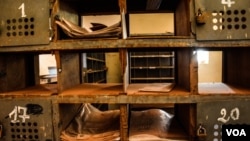Timbuktu's post office lacks both windows and doors. The only furniture inside the low brick building is a desk for the city's only postman, Ousmane Aliou Maiga.
Mail piles up in the adjoining room – letters, bills, debt collection demands. So many residents fled when conflict began in the north during 2012.
"We have been abandoned by the state," said Maiga. "For a long time, I didn't even bother to open the office. No one was sending any letters anymore. Then a couple of months ago, Ali came by with his postcards. Since then, things are looking up."
Ali Nialy is a former tour guide. He and other guides can no longer find work leading visitors along the city's sandy streets. The radical Islamist occupation in 2012 and continued threats put a stop to tourism in northern Mali.
But last year, Nialy partnered with an American hostel owner in Bamako, Phil Paoletta, to launch the website Postcards from Timbuktu.
"For a lot of people, especially in the United States, it's a place that's basically imaginary," said Paoletta. "It's like this imaginary town on the frontier of the desert from some ancient time. They don't know it's actually a real town and that people live there."
Timbuktu was founded in the fifth century and was an important desert trading post. But its location made it hard to reach, and in the Western world it became a metaphor for any distant and mysterious place.
Via the internet, customers now tell Nialy and the other former tour guides what messages they want written on their postcards.
"Some cards are love letters from people who feel that because the card is coming from a far-away city like Timbuktu, it shows the strength of their love," said Nialy. "Others talk about history and culture. Others are from people who have studied the history of the ancient city and hoped to visit but couldn't because of the insecurity."
It costs $10 to send a postcard. Half of the proceeds go to Nialy and his team of scribes.
And over at the post office, Timbuktu's only postman is busier than ever.
"Last month, I sent over 200 cards," said Maiga. "Ali is my most important client. Even if he comes on a Saturday, like today, I'll open the office just for him."
The cards help to show that Timbuktu is more than a legend — and is also open for business.





